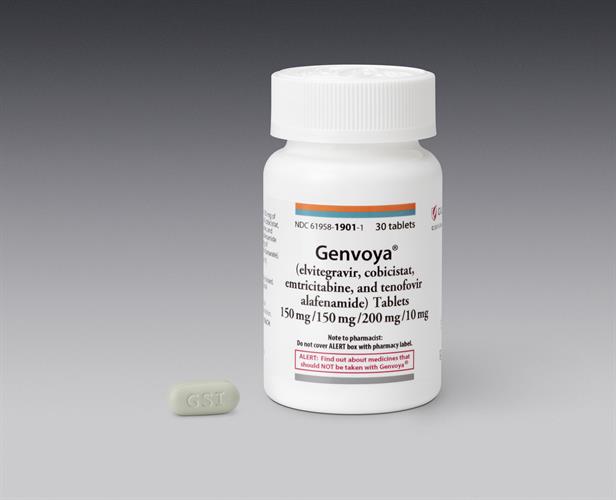
“Today’s approval of a fixed-dose combination containing a new form of tenofovir provides another effective, once-daily complete regimen for patients with HIV-1 infection,” said Edward Cox, MD, the director of the Office of Antimicrobial Products in the FDA’s Center for Drug Evaluation and Research.
Genvoya is indicated as a complete regimen for the treatment of HIV infection in adults and children 12 years of age and older who are treatment naive, or to replace the current antiretroviral regimen in those who are virologically suppressed (HIV RNA levels <50 copies/mL) on a stable antiretroviral regimen for at least six months with no history of treatment failure and no known substitutions associated with resistance to the individual components of the drug. No dosage adjustment of Genvoya is required in patients with estimated creatinine clearance no more than 30 mL per minute.
Because of TAF, Genvoya appears to be associated with less kidney toxicity and decreases in bone density than previously approved tenofovir regimens; however, patients receiving the drug experienced greater increases in serum lipids (total cholesterol and low-density lipoprotein) than patients receiving other treatment regimens in the studies.
Genvoya has a boxed warning regarding the risks for lactic acidosis/severe hepatomegaly with steatosis, and post-treatment acute exacerbation of hepatitis B. Health care providers are advised to monitor patients for kidney and bone side effects. It should not be given with other antiretroviral products, and may have drug interactions with a number of other commonly used medications.
“As the HIV patient population ages, there is an increased risk for development of age- and treatment-related comorbidities, including low bone mineral density and renal impairment. This is due to the combination of HIV infection, antiretroviral treatments and the natural aging process,” said David Wohl, MD, an associate professor of medicine in the Division of Infectious Diseases at The University of North Carolina at Chapel Hill. “Given its demonstrated efficacy and safety profile, Genvoya represents an important new treatment option for a range of patients who are either new to therapy or who choose to switch treatments.”
Genvoya was studied in a Phase III HIV clinical trial in more than 3,500 patients across 21 countries, including treatment-naive, virologically suppressed, renally impaired and adolescent patients. The approval is supported by 48-week data from two Phase III double-blind studies among 1,733 treatment-naive patients in which the regimen met its primary objective of noninferiority compared with elvitegravir, cobicistat, emtricitabine and tenofovir disoproxil fumarate (Stribild, Gilead). In the combined analysis of the studies, 92.4% of Genvoya patients and 90.4% of Stribild patients had HIV-1 RNA levels less than 50 copies/mL at week 48. Tests of certain renal and bone laboratory parameters also favored Genvoya over Stribild.
Additionally, the approval is supported by a Phase III study evaluating Genvoya among virologically suppressed patients who switched from TDF-based regimens. The study enrolled 1,436 patients, and 1,196 had reached the 48-week time point at the time of filing. Among those patients, Genvoya was found to be statistically noninferior to the TDF-based regimens based on the percentages of patients with HIV RNA levels less than 50 copies/mL at week 48. Patients receiving Genvoya also demonstrated improvements in certain bone and renal laboratory parameters compared with those treated with the TDF-based regimens. Finally, data from Phase III studies evaluating Genvoya among adolescents and patients with mild to moderate renal impairment supported the approval.
The FDA is reviewing two other TAF-based regimens, and approval is expected early next year.
The Centers for Disease Control and Prevention estimates that 1.2 million individuals aged 13 years and older are living with HIV infection, and that more than another 150,000 individuals in this age range have HIV but are unaware of their infection. Over the past decade, the number of people living with HIV has increased, while the annual number of new HIV infections has remained relatively stable.
Patient Assistance Programs
Gilead’s U.S. Advancing Access program provides assistance to patients in the United States who are uninsured, underinsured or who need financial assistance to pay for their medications, including Genvoya.The program offers support services for patients and providers, including:
- Access to counselors who can help patients and their providers with insurance-related needs, including identifying coverage options.The Advancing Access Copay Coupon Program, which provides co-pay assistance for eligible patients with private insurance who need assistance paying for out-of-pocket medication costs.
- The Advancing Access Patient Assistance Program and Truvada for PrEP Medication Assistance Program, which will provide Gilead medications at no charge for eligible patients with no other insurance options.
Additionally, Gilead is working closely with the ADAP (AIDS Drug Assistance Program) Crisis Task Force, as the company has done for each of its other HIV medications, to provide discounts to state ADAPs that will help ensure access to Genvoya for patients who receive medications through these programs.
—From FDA and company press materials
